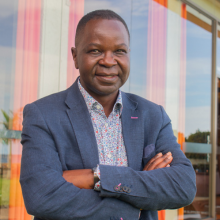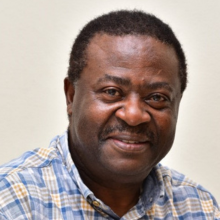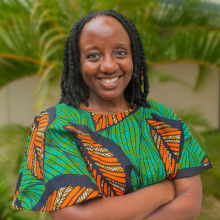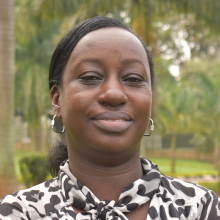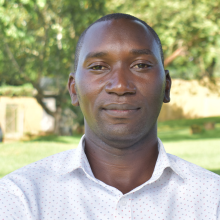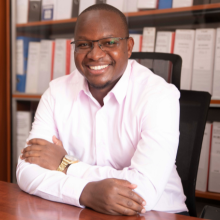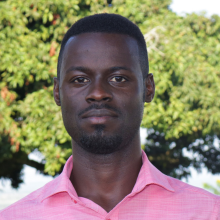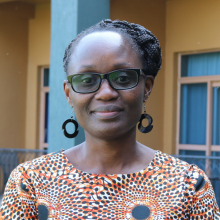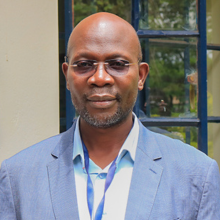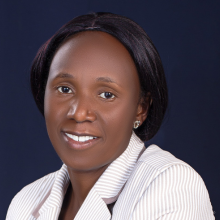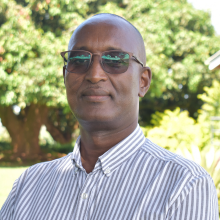Professor Moffat NyirendaUnit Director |
|
- Biography
Professor Moffat Nyirenda is the Director of the MRC/UVRI and LSHTM Uganda Research Unit. He is the Professor of Medicine (Global Non-Communicable Diseases) at the London School of Hygiene and Tropical Medicine (LSHTM) and heads the Non-Communicable Diseases Research Theme of the Unit. Before being appointed Director, he worked as the Deputy Director at the Unit.
He has served as the Director of Malawi Epidemiology and Intervention Research Unit. He was Professor of Research at the College of Medicine and Associate Director of the Malawi-Liverpool-Wellcome Trust Clinical Research Programme. He served as the Director of the Southern Africa Consortium for Research Excellence (SACORE), funded through the Wellcome Trust’s African Institutions Initiative.
Prof Nyirenda holds a BSc in Immunology from the University of London, Bachelor of Medicine, Bachelor of Surgery (BMMS) hybrid training from the University of London and the University of Malawi, and a PhD in Molecular Medicine from the University of Edinburgh.
His research interests lie in understanding mechanistic clinical and laboratory phenotyping of the etiology of chronic non-communicable diseases, investigating the risk of obesity, diabetes and hypertension in adulthood. Through various publications, he has contributed to genomics studies of NCDs in sub-Saharan Africa. Moffat has a particular interest in research capacity building in Africa.
He leads the Scientific Advisory Board for GSK Africa NCD Open Lab as chaiperson, and is a member of several other committees such as the Wellcome Trust Public Health and Tropical Medicine Interview Committee, MRC Global Health NCD Working Group, Awards Assessment Panel for Africa Research Excellence (AREF), WHO Working Group on the integration of NCDs in other programmatic areas, the Lancet Commission on Diabetes in Africa, and the Non-Communicable Disease Technical Advisory Committee to the Malawi Minister of Health.
Professor Pontiano KaleebuHead of Viral Pathogens Research Theme |
|
- Biography
Prof. Pontiano Kaleebu is the Director of the Uganda Virus Research Institute (UVRI) and former Director of MRC/UVRI and LSHTM Uganda Research Unit. He is a professor of immunovirology at the London School of Hygiene and Tropical Medicine and heads the Viral Pathogens Theme of the Unit.
He holds a medical degree from Makerere University and a PhD from the University of London. He is a Fellow of Royal College of Physicians-Edinburgh, a Fellow of Imperial College London, Faculty of Medicine, a Fellow of the Academy of Medical Sciences of United Kingdom, a Fellow of the Uganda National Academy of Sciences and a Fellow of the African Academy of Sciences. His main research interests are viral vaccine research including understanding protective immune responses in relationship to viral diversity, transmission, and disease progression. He is also actively involved in studies of HIV drug resistance (HIVDR) having led the initial development of the national HIVDR plan.
He has co-authored more than 360 publications in scientific journals and book chapters. He sits on many national and international committees including those of WHO, Africa CDC, USA NIH and EU-EDCTP. He chairs the HIV drug resistance Technical Working group under the Ministry of Health, he chairs the National COVID-19 Laboratory Quality Assurance Committee, sits on the Ministry of Health COVID-19 Scientific Advisory Committee and COVID-19 Vaccine Advisory committee. He has trained and mentored many students and scientists.
Professor Alison ElliottHead of Vaccines Research Theme |
- Biography
Professor Alison Elliott is theme leader for Vaccines Research at the MRC/Uganda Virus Research Institute (UVRI) and LSHTM Uganda Research Unit and Professor of Tropical Medicine at the London School of Hygiene & Tropical Medicine. Her main research interest is to understand how chronic and repeated infection exposure, and other environmental factors, determine population differences in immune profiles, disease susceptibility and, in particular, responses to vaccines.
She became interested in parasitology and research in Africa as an undergraduate and this interest was encouraged further by an elective in The Gambia. After completing medical training she joined the London School of Hygiene & Tropical Medicine and, during the late ‘80s and early ‘90s, undertook studies on the interaction between tuberculosis and HIV infection in Zambia. An infectious diseases fellowship in Denver, Colorado, followed, providing an opportunity to learn about management of drug resistant tuberculosis and about laboratory immunology. This enabled her to plan and conduct subsequent clinical-immuno-epidemiological studies. Since 1997 she has been based in Uganda at the MRC/UVRI and LSHTM Uganda Unit. Current research programmes include an NIHR Global Health Group on vaccines for vulnerable populations in Africa; an NIH-funded Tropical Medicine Research Center on schistosomiasis, and work on a controlled human infection model for schistosomiasis in the endemic setting.
Building capacity in infection and immunity research in Africa is a priority and each programme supports students and post-doctoral scientists, building on the work of the Makerere University – UVRI Centre of Excellence for Infection and Immunity Research and Training which she led from 2008-2022. This supported many fellows, and contributed to the development of a department of immunology and molecular biology at Makerere, and a Masters course, as well as supporting PhD students and senior fellows.
Dr Sheila Nina BalindaDeputy Theme Head - Vaccines Research Theme Sheila.Balinda@mrcuganda.org
|
- Biography
Dr. Sheila Nina Balinda, BSc, MSc, PhD is a Molecular Virologist at the MRC/UVRI & LSHTM Uganda Research Unit, with vast experience in One Health. She is part of the virus surveillance team, whose research work will inform priority immunogens for HIV-1 vaccine development and bnAB prevention approaches targeted to specific populations in Africa and India.
In 2001, Sheila completed her degree in biochemistry at Makerere University in Uganda and was later a Chevening scholar in applied molecular microbiology at Nottingham University, UK graduating in 2005. In 2011, Dr. Balinda attained a doctorate in molecular virology from Makerere University studying foot & mouth disease virus. Dr. Balinda then joined the research team at Joint Clinical Research Centre (JCRC) Uganda as project manager developing low-cost HIV-1 drug resistance tests for adult and pediatric cohorts. She completed her postdoctoral research funded by the International AIDS Vaccine Initiative (IAVI) under its Vaccine Immunology Science and Technology for Africa project (VISTA). This work contributed to the initial characterization of HIV-1 transmitted founder viruses of subtypes A, D and A/D in Uganda. Further, Dr. Balinda is a recipient of the SANTHE “path–to–independence” and the IAVI/Investigator initiated Research (IIR) capacity–building awards in which several graduate Master of Science Students were mentored.
Dr. Balinda now leads a team of Ugandan researchers developing and characterising a novel adeno–vector for vaccine development, funded by the Government of Uganda.
Dr Stephen CoseHead of Unit Immunology Platform Stephen.Cose@mrcuganda.org
|
|
- Biography
Dr Stephen Cose is an Assistant Professor in Immunology at the London School of Hygienne and Tropical Medicine, permanently seconded to Medical Research Council Uganda Research Unit. He is a Senior Immunologist and has an Honorary Senior Lectureship at the Makerere University College of Health Sciences.
Dr Cose's current research goal is to apply his expertise in fundamental cellular immunology to the investigation of tuberculosis in Uganda, a setting in which this disease is still highly endemic. In his previous posts, he undertook research into lymphocyte migration and trafficking, studies which were performed in mice and gave him key skills in isolating lymphocytes from tissues, multi parameter flow cytometry and immunofluorescence techniques.He joined the MRC/UVRI research Unit on AIDS in 2009 and his focus has since changed to human Immunology. He is a named co-investigator and project lead on an MRC funded project to look at whether a latent TB infection in mothers affects their infant’s response to BCG. Dr. Stephen Cose is also undertaking other projects like the non-specific effects of BCG in infants and a post-mortem study being piloted at Mulago Hospital collaboration with the Pathology Department to look at the immune response to TB in the tissues, the site at where the infection is.
Dr Deogratius Ssemwanga, PhDHead of Unit Sequencing Platform Deogratius.Ssemwanga@mrcuganda.org
|
|
- Biography
Dr. Deogratius Ssemwanga is a Molecular Virologist with a PhD in Molecular Virology from Makerere University Kampala.
He is the Head of the Unit’s Sequencing Platform, a national and regional reference laboratory to several viral pathogens and party to the H3ABionet consortium, an African conglomerate of Bioinformaticians dedicated to developing bioinformatics capacity in Africa. He is actively involved in work that is aimed at the development of molecular tools for virus discovery, surveillance, and diagnostics. He has mentored and trained several undergraduate and postgraduate students both locally and internationally and continues to contribute to research capacity building through his work.
Dr. Ssemwanga’s main research areas include the study of the virological and immunological correlates of HIV-1 superinfection, a phenomenon where confirmed HIV infected individuals subsequently become infected with other HIV variants, information that is important to inform vaccine design and development. This work involves the use of next generation sequencing with bioinformatics approaches to determine HIV superinfection and neutralization assays to determine the development of neutralizing antibodies prior to and after superinfection. His other research interests include studies in HIV drug resistance and molecular epidemiology of HIV in Uganda.
Dr Joseph Mugisha OkelloHead of General Population Cohort Platform |
- Biography
Dr. Joseph Mugisha is a clinical epidemiologist with an MSc in Clinical epidemiology and Biostatistics from Makerere University, a doctorate in epidemiology and population health from the University of London, at London School of Hygiene and Tropical Medicine and a post-doctorate from the University of Missouri, Columbia USA. Dr. Mugisha also trained and qualified as a medical doctor from Mbarara University of Science and Technology, and prior to his research career, he practiced medicine at Masaka Regional Referral Hospital.
At the MRC/UVRI and LSHTM Uganda Research Unit, Dr. Mugisha heads the General Population Cohort Platform (GPC), which is a one stop center for population-based studies. Since 2016, he has been involved in surveys on disability to assess the prevalence of functioning difficulties under a number of domains and to look at needs of assistive devices among people with functioning difficulties.
Dr. Mugisha’s research interest lies in the health and wellbeing of older people in low- and middle-income countries, and how NCDs and HIV impact on ageing. He has previously led a cohort study of older people living with and without HIV in Uganda. Also, his PhD thesis focused on the epidemiology of anemia among old people in rural Uganda and how anemia impacts on functioning in older people.
Mrs Florence Nambaziira MuzaaleHead of Clinical Diagnostics Laboratories and Biobanking Platform Florence.Nambaziira@mrcuganda.org |
- Biography
Mrs. Muzaale is a medical laboratory scientist by training with a master of science in emerging and neglected infectious diseases from the University of Edinburgh UK. She is currently the Head of the Unit’s Clinical Diagnostics and Laboratories and Biobanking Platform.
Mrs. Muzaale has over sixteen years of experience in managing laboratory clinical diagnostics service delivery across several key disciplines including hematology, microbiology, molecular and clinical chemistry. She has been at the forefront of technical teams at the Joint Clinical Research Center (JCRC) and Nakasero Hospital, in Uganda.
Her specialty over the years has included research work, clinical trials, safety testing, and clinical diagnosis for infectious and non-communicable diseases. She is currently managing clinical diagnosis and safety testing for over 25 studies and clinical trials at the Unit.
Dr Nambusi KyegombeHead of Social Science Research |
|
- Biography
Dr Nambusi Kyegombe is an interdisciplinary social scientist who holds an MSc in Demography and Health from the London School of Hygiene and Tropical Medicine (LSHTM) and a Doctorate in Global Health and Development, also from LSTHM.
Dr Kyegombe leads the Unit’s research on the social determinants of health, is the Head of the Gender, Violence and Health Research Group and is a co-Director of LSHTM’s Gender Violence and Health Centre. Dr Kyegombe co-leads the Adolescent theme of LSHTM’s centre for Maternal Adolescent and Child Health (MARCH) and co-organises the LSHTM- WHO short course on Global Adolescent Health. She is recognised for specialisms in the qualitative evaluation of complex violence prevention interventions; formative research to understand the drivers, causes and context in which violence, and other gendered forms of inequality are produced and reproduced; and developing ethical guidance for the conduct of high quality, ethical research, particularly among marginalised populations, in low- and middle-income countries.
Dr Kyegombe sits on LSHTM’s high-risk observational study ethics committee and is a Fellow of the UK’s Higher Education Academy.
Dr Andrew AbaasaHead of Statistics and Data Andrew.Abaasa@mrcuganda.org,
|
- Biography
Dr. Andrew Abaasa is a certified Medical Statistician with expertise in Medical Statistics, Epidemiology and population health and a Doctorate from the London School of Hygiene and Tropical Medicine, United Kingdom. Dr. Abaasa has over 15 years of research experience in applied Medical Statistics, largely working in Africa with European and Northern American partners. His career in Medical Statistics and Epidemiology is built on three pillars; simplicity (use of less statistical theory when communicating with non-statisticians), conciseness, and mentorship (helping others in need of med stat knowledge).
Dr. Abaasa leads statistics and data teams at the MRC/UVRI and LSHTM Uganda Research Unit in the design, conduct and analysis of data of randomised controlled trials and other epidemiological studies. His major research interest is in the design, conduct and analysis of RCTs in the era of widespread use of active controls in the HIV preventions field.
Professor Robert NewtonHead of Oncogenic Virus Immunovirology - Viral Pathogens Research Theme |
|
- Biography
Professor Robert Newton qualified in Medicine in London in 1991, and was subsequently awarded a MRC Research Training Fellowship enabling him to begin a career in epidemiology, initially in Oxford with Dame Valerie Berol FRS and subsequently at the University of York. In 2012, he was seconded to the MRC/UVRI Research Unit in Entebbe, Uganda, where he is the Senior Epidemiologist and Head of the Cancer Epidemiology Group. A major component of his work involves capacity building for cancer research, with responsibility for identifying and developing local talent.
He has more than 30 years of cancer research experience in Africa. His scientific contribution has been to enhance the understanding of the patterns and causes of cancer in sub-Saharan Africa and he has a track record of successfully managing complex research projects on the continent. Throughout the 1990s and early 2000s, Newton conducted a series of cancer studies in Uganda and elsewhere in Africa, that helped to characterise and quantify the key risk factors. More recently, he and others have worked to define the epidemiology of these risk factors in population-based studies, with a view to developing interventions in the future.
Dr Jennifer Serwanga, PhDCo - Head of Viral pathogen discovery, diversity Jennifer.Serwanga@mrcuganda.org |
|
- Biography
Dr. Jennifer Serwanga is a Principal Research Scientist and Immunologist at the MRC/UVRI & LSHTM Uganda Research Unit. Her unwavering passion, coupled with a robust educational foundation, including a DPhil in Viral-Immunology from Murdoch University, Western Australia, has continuously advanced the scientific understanding of anti-viral immunity and vaccine immunogenicity. Dr. Serwanga's career is marked by her leadership in high-impact projects, including the PrEPVacc trial, which spans multiple African nations, several vaccine trials for RVF, COVID-19, and HIV and her pivotal role in developing an inactivated COVID-19 vaccine. Her collaborative efforts with esteemed institutions such as Kings College London, NIH, NICD and La Jolla Institute for Immunology have led to new advancements in monoclonal antibody discovery and the exploration of B- and T-cell responses to viral infections and vaccines. Her expertise in immunology has been instrumental in establishing international collaborations, hosting a CEPI centralised lab in Africa, fostering innovation, and strengthening research capabilities within the unit.
Dr. Serwanga's ability to secure significant funding from prestigious organisations such as IAVI-ADVANCE, EDCTP, CEPI, BMGF-GIISER, and the Uganda government is a testament to the importance and credibility of her research. Her work in establishing a pan-African laboratory network enabled comprehensive studies on the relationship between HIV diversity and T-cell immune responses, providing valuable insights for HIV vaccine development. Currently, she is pioneering efforts to utilise cutting-edge technologies such as 10x Genomics and Mesoscale Discovery for comprehensive immune profiling and assay development. These innovations are crucial for elucidating the molecular basis of induced immunity and identifying biomarkers of protection, particularly in the context of emerging epidemics and pandemics. Dr. Serwanga's research, widely published in leading peer-reviewed journals, including Science, Nature, and J Virol, showcases her impact on advancing scientific knowledge.
As a mentor and advocate for diversity, equity, and inclusion, she has nurtured numerous PhD, MSc, undergraduate students and professionals, fostering their growth and contributing to capacity building in immunology. Her collaborative efforts have established a pan-African laboratory network, enhancing regional research capabilities. She actively participates in public engagement, policy advising and technical guidance for national health committees. Her unwavering commitment to advancing immunological research and improving public health makes her a prominent leader in the scientific community. Dr. Serwanga continues to drive innovation in immunology research, employing cutting-edge technologies like 10x Genomics and Mesoscale Discovery immune profiling to advance our understanding of viral pathogens and improve public health outcomes, increasing the Unit’s visibility.
Dr Nicholas BbosaHead of Virus Discovery - Viral Pathogens Theme |
- Biography
Dr. Nicholas Bbosa is a Virologist by training with a PhD in Molecular Virology from Makerere University. He is currently a senior scientist and project leader at the MRC/UVRI & LSHTM Uganda Research Unit and an Assistant Professor of at the London School of Hygiene and Tropical Medicine (LSHTM), UK.
Nicholas completed a Postdoctoral fellowship at the MRC/UVRI & LSHTM Uganda Research Unit in 2021 where he investigated the Molecular Epidemiology of HIV transmission in key and general population groups in Uganda. He has also undertaken several fellowships in pathogen genomics big data analysis at the University of Oxford (UK), University of Edinburgh (UK) and Imperial College London (UK).
His research interests focus on the use of next generation sequencing, molecular phylogenetics, pathogen phylodynamics, infectious disease models and bioinformatics to understand disease transmission networks, with the goal of informing epidemic response. He is currently involved in SARS-CoV-2 genomics and viral pathogen discovery studies.
Dr Gyaviira NkurunungiCo - Head of Immunomodulation - Vaccines Research Theme Gyaviira.Nkurunungi@mrcuganda.org |
- Biography
Dr. Gyaviira Nkurunungi holds a PhD in immuno-epidemiology (2016-2019) and an MSc in immunology (2013-2014) from the London School of Hygiene and Tropical Medicine. His PhD focused on immunological mechanisms of helminth-allergy associations in rural and urban Uganda, with an emphasis on antibody studies.1,2,3 Earlier in his career, he contributed to work on childhood tuberculosis infection, describing utility of interferon-gamma release assays in Ugandan children, at the time hailed as the ‘100-year upgrade’ in TB diagnosis.4
Currently, Dr. Nkurunungi leads the immunology team on an MRC UKRI-funded programme of Ugandan trials assessing population differences in vaccine-specific responses.5 His EDCTP-funded preparatory fellowship (2021) and Wellcome-funded early-career training fellowship (2022-2025) use samples from these trials, and cutting-edge wet lab techniques and integrative computational approaches, for studies aimed at unravelling biological predictors of vaccine response. He is also the immunology work package lead on the NIH-funded Uganda Schistosomiasis Multidisciplinary Research Centre, which aims to develop a comprehensive understanding of the biological drivers of severe schistosomal morbidity.
His major research focus is on the immunomodulating effects of chronic infections on communicable and non-communicable diseases, and on vaccine immunogenicity and effectiveness.
1Clin Exp Allergy 2019;49(5): 663-676
2Clin Exp Allergy 2021;51(5): 703-15
3Allergy 2021; 76(1):233-46
4PLoS One 2012;7(10): e47340
5BMJ Open 2021;11(2): e040425
Dr Ludoviko ZirimenyaCo - Head of Immunomodulation - Vaccines Research Theme Ludoviko.Zirimenya@mrcuganda.org
|
- Biography
Dr Ludoviko Zirimenya is a Clinical Research Scientist and Palliative care Physician. He holds a medical degree from Muhimbili University of Health and Allied Sciences, Tanzania, MSc internal medicine and an MPH from the University of Edinburgh, Scotland. He is currently pursuing a staff PhD at the LSHTM in Vaccine epidemiology focusing on how biological determinants such as malaria affect vaccine responses and susceptibility to infections such as SARS-CoV-2.
Before joining the Unit in July 2018, he served at Hospice Africa Uganda for nine years as a palliative care medical doctor prior to becoming the Director of Clinical Services. Ludoviko supported health policy and advocacy efforts in Uganda and other African countries. He also supported training of health workers at undergraduate and post graduate levels in Uganda at the Institute of Hospice and Palliative care in Africa that is affiliated to Makerere University.
At the Unit, Ludoviko has led the POPVAC clinical trials programme and observational research in the field of vaccines. His research area of interests are population differences in vaccine responses, Non-specific (beneficial) effects of vaccines and clinical palliative care research.
Ludoviko is married to Diana and together, God has blessed them with three children Darian Luke, David Lewis and Davin Levi.
Dr Moses EgesaHead of Schistosomiasis Research - Vaccines Research Theme Moses.Egesa@mrcuganda.org
|
- Biography
Dr Moses Egesa is a Research Fellow at the London School of Hygiene and Tropical Medicine, an Honorary Senior Scientist at the MRC/UVRI and LSHTM Uganda Unit and an Honorary Senior Research Officer at the Uganda Virus Research Institute. He received his Ph.D. (Parasite Immunology) from Makerere University (2020). For a decade, Dr Egesa works on the immunology of schistosomiasis. His overarching research goal is to contribute to the development of effective vaccines for schistosomiasis. In February 2023, he co-chaired the First Uganda Schistosomiasis Symposium held in Entebbe, Uganda.
He is an EDCTP Career Development Fellow (2020-2023) characterizing protein and glycan epitopes recognised following controlled and natural human infection with Schistosoma mansoni in an endemic population. The EDCTP fellowship builds on his people-centric contributions as the Project Leader (PRINCE2 certified) for the Wellcome-funded programme “Establishing a single sex S. mansoni controlled human infection model for Uganda”. He is a co-investigator on various local and international collaborative schistosomiasis research grants from NIH, HIC-Vac network, GCRF and EU’s Horizon 2040.
Dr Egesa achieved the status of Fellow of the Higher Education Academy UK (2023) after successfully completing the Postgraduate Certificate in Learning and Teaching (University of London). He teaches MSc and MMED students at Makerere University and supports student learning at the LSHTM.
Professor Eugene KinyandaHead of Mental Health Research - Non Communicable Diseases |
|
- Biography
Professor Eugene Kinyanda is a senior investigator scientist and head of the mental health project at the MRC/UVRI Uganda Research Unit on AIDS. He completed his undergraduate studies in Human Medicine at Makerere University and undertook postgraduate training in psychiatry at the same University. He did his PhD at the Norwegian University of Science and Technology in the sub-speciality of suicidology. He holds an honorary professor position at the LSHTM in the Faculty of Epidemiology and Population Health.
Eugene joined the MRC/UVRI initially as a research manager but later went on to start a mental health project at the Unit. Over the last six years he has undertaken research into the psychiatric and psychosocial complications of HIV/AIDS among adults through funding by DfID (as part of the EfA Consortium) and the European-Developing Countries Clinical Trials Programme (EDCTP; through a Senior EDCTP Fellowship). He is currently undertaking a research project on children and adolescents living with HIV/AIDS through funding from an MRC/DFID African Leadership Award with the Global Centre for Mental Health at LSHTM.
His other research interests include studies into the psychiatric and psychosocial problems of HIV/AIDS orphans, war affected populations, the epidemiology of common mental disorders and studies into the meanings of suicide from an African perspective. This body of work has led to more than 40 publications in peer reviewed journals.
Dr Femke Bannink MbazziHead of Disability Research - Non Communicable Disease Research Theme Femke.Bannink@mrcuganda.org
|
- Biography
Dr Femke Bannink Mbazzi is an Associate Professor at the International Centre for Evidence in Disability (ICED) at the London School of Hygiene and Tropical Medicine (LSHTM), based in Uganda, where she heads the Disability Research Group at the Unit. The Disability Research Group consists of East African researchers, including persons with disabilities, who develop and implement African disability research.
She studied clinical and educational psychology and cultural anthropology in The Netherlands and Belgium. She moved to Uganda in 2003 where she has worked as a clinician and researcher since. Her research focuses on disability inclusion and mental health. She is passionate about developing evidence based culturally appropriate health and education interventions with persons with disabilities through participatory and co-creative research.
Monica BadaruHead of Finance & Administration |
|
- Biography
Monica Badaru was appointed Head of Finance and Deputy Unit Chief Operating Officer in 2022 for MRC/UVRI & LSHTM Uganda Research Unit after serving as Finance Manager. She has over 15 years of experience in finance and accounting throughout her career in profit and non-for profit organizations with a passion for financial planning and analysis and artificial intelligence in finance processes.
As the Head of Finance, Monica is responsible for the strategic leadership for the Unit’s finance functions and management of its financial and capital resources. She oversees Budget and Financial planning, financial governance and Reporting, Financial systems development and capacity building, Treasury and liquidity management, Accounts payables and receivables, and staff. As the deputy Unit COO, she assists the Unit Chief Operating Officer to implement continuous operational excellence to support science and research at the Unit.
Monica has a Bachelor of Commerce degree from Makerere University and a Master of Business Administration degree from Heriot-Watt University, United Kingdom. She also holds certifications with Association of Certified Chartered Accountants (ACCA), Certified International Business Leader (CIBL) with IIET, and Cambridge Judge Business School – General Management Programme (GMP)
Janet Godsend NshahoHead of Human Resources GodsendJanet.Nshaho@mrcuganda.org |
- Biography
Ms Godsend has over ten years of experience in Human resources across the Private, NGO and consultancy sectors. Her key areas of interest are in Organizational development, Process improvement, system development, change management, building inclusive cultures, empowering teams and increasing business productivity. Ms. Godsend thrives in an environment that provides a learning platform and an environment for members to explore and try out new things.
She enjoys working with diverse teams and sharing her knowledge, skills, ideas and experiences. She also likes learning new things and sharing innovative ideas on enhancing productivity, improving business processes and enhancing staff wellbeing through fostering an environment that is inclusive, happy and engaging.
Achilles KiwanukaHead of Training and Career Development Achilles.Kiwanuka@mrcuganda.org |
|
- Biography
Achilles Kiwanuka is a result-oriented research capacity building and digital health specialist with over 14 years of experience. He has built the capacity of several individuals at the master, doctoral, and postdoctoral levels. He is part of several regional and international capacity-strengtheningconsortia. He has previously won grants as Principal Investigator or co-Principal Investigator from the Africa Research Excellence Fund (AREF), the European & Developing Countries Clinical Trials Partnership (EDCTP), and the National Institute for Health and Care Research (NIHR).
Dr Geofrey KimbugweHead of Research Governance |
- Biography
Dr Geofrey Kimbugwe Heads the Research Governance Department at the MRC/UVRI & LSHTM Uganda Research Unit. He holds a Bachelor of Medicine and Bachelor of Surgery Degree from Gulu University, a Master of Science Public Health from Clarke International University and an Advanced Post Graduate Diploma in Clinical Research and Quality Assurance from James Lind Institute, where he is currently enrolled for an MSc in Clinical Research. He is a GCP trained Auditor and is currently undertaking the CRA certification course by The CRA School Cananda. He is a member of the London School of Hygiene and Tropical Medicine (LSHTM) Research Governance Committee and The Research Quality Association.
He leads the Research Governance Department, an independent department at the Unit, that supports all research activities by ensuring compliance with regulatory requirements; ethical requirements; international standards of best practice such as Good Clinical Practice (GCP), Good Research Practice (GRP), Human Subject Protection (HSP), Good Clinical Laboratory Practice (GCLP), ISO15189:2022, Declaration of Helsinki; and LSHTM/Unit Standard Operating Procedures (SOP) and Policies, among others.
Being a medical doctor with special interest in public health, clinical research and research governance, Dr Geofrey Kimbugwe has participated in the conduct of a number of observational studies and vaccine and treatment clinical trials for HIV and emerging infectious diseases including Ebola and COVID-19. Geofrey has over 8 years’ experience in clinical research conduct and management and provides overall sponsorship, ethical, regulatory, monitoring and quality assurance oversight for the Unit’s research activities.
Mariam NantezaHead of the Research Support Office |
- Biography
Mariam Nanteza is a grant management specialist, she joined the Unit on 8th May 2017 with over 8 years of experience in Financial Management, Grants Management and administrative roles. She is a qualified Accountant, a Fellow of the Association of Certified Chartered Accountants-ACCA and also a member of the Institute of Certified Public Accountants of Uganda-ICPAU. Mariam holds a Post Graduate Diploma in Financial Management (PGDFM), a Master’s Degree in Business Administration (MBA) and is currently pursuing a Doctorate of Business Administration.
Ms. Nanteza has served both Development and Research organizations in different capacities. She started her career as an Administrative Officer, she also worked as a Finance officer, Grants Officer, and Senior Grants coordinator before joining MRC/UVRI&LSHTM Uganda Research Unit as a Senior Grants Officer.
In her current role as the Head of the Research Support Office, she writes policies and leads the assessment and management of departmental risks. She also coordinates the sourcing and circulation of funding opportunities to staff, oversees the grant application pre-submission approval processes, and facilitates contract/ MTA/ confidentiality agreement negotiations. On a monthly basis, she updates the Unit Management and Heads of Departments about the general operation of the Research Support Office and summarizes the status of applications, awards, and pipelines as well as oversees fund monitoring, preparation, and submission of donor financial reports for over 100 donor-funded projects among other responsibilities.
Nicholas NsubugaUnit Quality Manager |
- Biography
Nicholas Nsubuga serves as a Unit Quality Manager at the MRC/UVRI and LSHTM Uganda research Unit. He has over 10 years’ experience in Quality and Risk management, strategic planning and monitoring in nonprofit organizations.
In his current position, Nicholas is responsible for overseeing and facilitating the continuous improvement of Quality across all areas of Unit activity, managing the Unit’s Quality Management Systems (QMS), Risk management, conducting and supporting internal external audits and maintaining a functional and well documented framework of policies and procedures.
Nicholas is a member and a fellow with the International society of quality in healthcare-ISQua and holds a Master’s degree in Monitoring and Evaluation.
CPA Julius KakaireSenior Accountant |
- Biography
CPA Julius Kakaire serves as the Senior Accountant of MRC/UVRI and LSHTM Uganda Research Unit. Julius has over Eight years of experience in Finance and Accounting for nonprofit and profit organization settings. He has exposure in managing the entire full accounting cycle and first hands-on working experience with local and international partners. He recognizes and appreciates the complexities around managing financial resources and strives to achieve organizational objectives in an effective, efficient, and transparent way.
As a finance person, Julius is responsible for preparing budget-based reports, implementation of system controls, cash management and he is an agent for positive changes. He further acts with high integrity, professional behavior and does his work with a lot of professional skepticism.
Julius is a Certified Accountant, a member of the Certified Public Accountant of Uganda. (ICPAU) and holds a master’s degree in business administration from Makerere University.
Dr Freddie Mukasa KibengoHead of Masaka Field Station |
|
- Biography
Dr Freddie Mukasa Kibengo is a Senior Scientist and Principal Investigator with the Viral Pathogens and Vaccine Research themes. He completed his undergraduate studies in Human Medicine at Mbarara University of Science and Technology (MUST) and post-graduate training in Internal Medicine at Makerere University and in Public Health at the London School of Hygiene and Tropical Medicine (LSHTM). He is a Fellow of the Physicians (FCP) of East, Central, and Southern Africa (ECSA). He is also a member of the Uganda Medical Association (UMA), Association of Physicians of Uganda (ASOU), World Federation of Neurology (WFN), and American Society of Microbiology (ASM).
His research interests focus on the epidemiology of infectious diseases, particularly in the fields of early and recent HIV infection, HIV transmission networks, development of HIV and other infectious diseases vaccines, and novel and cost-effective strategies to improve the management of HIV/AIDS-related opportunistic infections (including tuberculosis and cryptococcosis) and other co-morbidities. His other research interests include optimisation of childhood vaccines, HIV Pre-Exposure Prophylaxis (PrEP), and other novel HIV preventive technologies.
Dr Sylvia KusemererwaDeputy Head of Masaka Field Station Sylvia.Kusemererwa@mrcuganda.org |
|
- Biography
Dr. Sylvia Kusemererwa is a Scientist A at the MRC/UVRI and LSHTM Uganda Research Unit. She holds a Bachelor of Medicine and Bachelor of Surgery (MBChB) and a Master of Public Health (MPH) from Makerere University and is also an Afya Bora fellow of Global Health.
Dr. Kusemererwa's career in clinical trials began over a decade ago, during which she has played various pivotal roles in groundbreaking studies. She monitored the safety of participants during the Partners PrEP trial at The AIDS Support Organization (TASO) site, contributing to the field of HIV prevention. As the Principal Investigator for the dapivirine vaginal ring microbicide trials at the Unit, she led innovative research aimed at developing novel HIV prevention strategies for women. Her leadership and expertise are key in advancing the understanding of a new microbicide technology and its potential impact on reducing HIV acquisition.
Currently, Dr. Kusemererwa is coordinating a HIV vaccine trial (PrEPVacc). She is committed to advancing HIV prevention research and bringing innovative interventions to the communities most affected by the epidemic.
Sarah Kizito MusokeAdministrator - Masaka Field Station |
|
- Biography
Sarah Kizito is an Administrator with a Bachelor’s degree in Business Administration and Management attained from Uganda Martyrs University, Nkozi. Sarah Kizito has also trained in various courses like Strategic Office Management and Administration from Global Focus Training Group in Nairobi; Effective Financial Accounting from Modern Management Institute, Nairobi; Management Skills Development and Effective Supervision and Management from TACK Training Institute, Nairobi.
Sarah has worked as an administrator at the MRC/UVRI/LSHTM Uganda Research Unit field station in Masaka district since February 1994. She supervises all administrative and support staff at the Station and Act as the first point of contact on any Human Resources matters. Sarah also coordinates the station’s fleet and finance management using Microsoft Dynamics and Navision.
She is passionate about ensuring that the Masaka field station is managed as a platform for scientific projects to run successfully through the effective and efficient use of resources.
John Bosco KatereggaAdministrator - Kyamulibwa Field Station John.Kateregga@mrcuganda.org |
- Biography
John Bosco Kateregga is the Field Station Administrator for the MRC Kyamulibwa Station, under the Administration Support function of the MRC / UVRI Uganda Research Unit on AIDS. He is a graduate of the Makerere University Business School, trained as Certified Public Accountant of Uganda and also student of the Chartered Institute of Management Accountants of the United Kingdom.
He has been Administrator for the last 11 years engaged in the routine station administration but also involved in administering projects’ finances, logistics and field work of the core General Population cohort, and earlier at the sex workers’ cohort. This support is extended to - and has been very pertinent to - the continuation and expansion of research, Sustaining a cohort platform, Longitudinal studies, Basic Science studies, starting of an interventional study and a vaccine efficacy trial - all happening within these two cohorts.
He previously worked in commercial settings and then as Unit Accountant for 11 years, a role in which he championed successful implementation of an enterprise resource management system – Navision Financials – basis to the current MS Dynamics
Dr Anne KapaataPost-Doctoral Scientist - Viral Pathogens Theme Anne.Kapaata@mrcuganda.org,
|
- Biography
Dr Anne Kapaata (BSc, MSC, PhD) is currently a post-doctoral scientist at MRC/UVRI & LSHTM Uganda Research Unit, with over a decade’s experience working with HIV-1 viruses. She is currently working on the virus surveillance project where she is identifying HIV-1 Unique transmission signatures associated with HIV-1 transmission to inform immunogens for HIV-1 vaccine development.
In 2005, Anne completed her degree in Biomedical laboratory technology at Makerere University in Uganda and later in 2012 completed her MSc in Biomedical Laboratory sciences and Management at Makerere University. In 2022, Dr Kapaata attained a doctorate in Molecular Virology from Makerere examining genotypic and phenotypic Characterization of HIV-1 transmitted/founder viruses and their effect on cytokine profiles and disease progression among acutely infected Ugandans. Dr Kapaata Joined the MRC/UVRI & LSHTM unit in 2006 as a laboratory technologist where she worked on several HIV-1 laboratory-based projects and her role was to design and execute the laboratory aspects of these studies.
Dr Kapaata is a recipient of the recent IAVI/Investigator initiated Research (IIR) capacity-building award where she is mentoring MSc students and exploring the use of next generation sequencing methodologies to improve HIV-1 incidence estimation in the population.
Dr Harriet MpairweClinician and Epidemiologist - Non Communicable Diseases Research Theme |
|
- Biography
Dr. Harriet Mpairwe is a clinician and epidemiologist whose main research interest is investigating the causes of the increasing prevalence of asthma and other chronic inflammatory diseases in developing countries. She obtained her Master’s degree (Epidemiology) and PhD training from the London School of Hygiene and Tropical Medicine.
She joined the MRC Unit in 2003 to work with the Entebbe Mother and Baby Study (EMaBS). She took an active role in aspects of EMaBS investigating the relationship between worm infections and allergic conditions, and has published in this area. She is currently a Wellcome Trust fellow investigating the risk factors associated with asthma among children in Uganda, with emphasis on chronic immune-modulating infections such as worms and malaria. With colleagues within the Co-infections Studies Programme, she is interested in the possible therapeutic role of worms in the management of asthma and other chronic inflammatory diseases.
Dr Josephine BirungiSenior Scientist Josephine.Birungi@mrcuganda.org |
- Biography
Dr. Josephine Birungi is a senior scientist at the Medical Research Council/Uganda Virus Research Institute and LSHTM Uganda Research Unit. Her research focuses on HIV/AIDS, diabetes and hypertension.
She has a bachelor’s degree in medicine and surgery from Makerere University Medical School, a postgraduate diploma in public health from the University of Manchester and a master’s degree in international business administration from ESLSCA Business School in Paris. She trained in implementation science at the University of San Francisco.
In partnership with the TASO Uganda, Dr. Birungi successfully implemented the INTE-AFRICA trial, that evaluated integrated care for persons with HIV, diabetes and Hypertension in Uganda. The results from this trial informed the development of the Uganda national consolidated guidelines for HIV and Antiretroviral therapy.
Before joining the Unit, Dr. Birungi worked at The AIDS Support Organization (TASO) in Uganda, where she helped implement antiretroviral therapy (ART) in a rural clinic in 2004 after the WHO's 3 by 5 declaration.
With over 20 years of research experience, Dr. Birungi co-chairs the research scale-up group at the Global Alliance for Chronic Diseases (GACD), is a member of the Non-Communicable Diseases (NCD) technical working group at the Ministry of Health in Uganda and is part of the Uganda Society for Health Scientists.
Dr Yunia MayanjaResearch Scientist Yunia.Mayanja@mrcuganda.org Yunia.Mayanja@lshtm.ac.uk
|
|
- Biography
Dr Yunia Mayanja is a scientist working with the HIV Interventions program of the MRC/UVRI and LSHTM Uganda Research Unit. She holds and medical degree from Makerere University- Uganda and has post graduate training (MPH) from Makerere University. She is currently pursuing doctoral studies at Karolinska Institute – Sweden (2022-2026). The overall aim of the doctoral studies is to improve HIV prevention among adolescent girls and young women in Kampala, Uganda.
From 2012-2019, she led a research team that worked with the first cohort of female sex workers (FSWs) in Uganda (The Good Health for Women Project). The cohort was established to study HIV/ STI epidemiology in this population; she led other studies including HIV vaccine preparedness studies among FSWs and studies investigating Hepatitis B infection. Since 2019, Yunia has been principal investigator on projects among adolescents and young women, funded by IAVI-ADVANCE and EDCTP (TMACDF2016-1574). She is a co-applicant on an on-going project “Universally Accessible Prevention Technologies for African girls and young women through Knowledge applied from behavioral Economics” (UPTAKE); funded by EDCTP2, CSA2018HS-2525 (2020-2024).
Yunia is an ITAPS/ IAVI Alumni who was trained in manuscript writing in 2015 at the University of California, San Francisco, and later as a mentor in 2018. She mentors scientists writing manuscripts for submission to peer reviewed journals.
Dr Rwamahe Rutakumwa, PhDCo-Investigator of Ebola+D Study |
|
- Biography
Dr Rwamahe Rutakumwa is a Senior Scientist in the Mental Health Focus Area of the Non-Communicable Disease research theme. He holds a baccalaureate in Social Sciences from Makerere University, as well as a MSc. and a PhD in Rural Sociology from the University of Alberta, Canada. His research background is in poverty and health, public policy in the developing world, and how structural forces at national and global levels interface to impact the incidence of and efforts to alleviate poverty.
In the 11 years prior to joining the MRC/UVRI & LSHTM Uganda Research Unit in 2011, Rwamahe was involved in multiple social science and health research projects and has authored/co-authored various publications. His current research focuses on the socioeconomic, cultural and behavioural aspects of mental health and illness, with a keen interest in how these influence mental illness exposure but also treatment outcomes.
Dr Agnes Ssali, PhDSocial Science Representative - Vaccines Theme |
|
- Biography
Biography:
Agnes Ssali is a senior social scientist at the MRC/UVRI & LSHTM Uganda Research Unit and Research Fellow in the department of Global Health and Development at the London School of Hygiene and Tropical Medicine (LSHTM). She has been with the Unit since 2003. She trained at Makerere University for her Bachelor’s (SWSA) and Master’s (Social Sector planning and Management). She holds a post graduate diploma in public health from London School of Hygiene and Tropical Medicine (LSHTM). Her doctorate in International Development was obtained from the University of East Anglia (UEA) in the United Kingdom. Her doctoral research was on the informed consent process in HIV clinical trials in Uganda; an area she continues to pursue in research and intervention projects.She has been engaged in social and behavioural research on HIV, including looking at the social aspects of health and livelihoods of research volunteers, for over twenty years. She led on an intervention project supported by PEPFAR through CDC for four years. The project targeted the reduction of HIV in a key population of female sex workers, their male regular sexual partners and children in Kampala, the Uganda MRC/UVRI & LSHTM Research Unit was one of the implementing partners in the Kampala region. In addition to HIV research, she is currently working with a multi-disciplinary team targeting to research on how to control schistosomiasis in Uganda through a controlled Human Infection study which would contribute to vaccine development for the control of the infection in Uganda and elsewhere. Agnes is also involved in vaccine confidence research in maternal vaccine research being conducted in Kampala under the Makerere University John Hopkins collaboration (MUJHU). She is a mentor and supervisor of research students in the social science discipline.
As a behavioural scientist she continues to conduct research and contribute to several collaborative research projects within the MRC Unit and with collaborating research partners. She has experience in strategic planning. Her major areas of research interest are HIV and the ethics of the conduct of biomedical research and exploring potential interventions for vulnerable populations in both rural and urban communities. She served on the Uganda Virus Research Institute Research and Ethics Committee (REC) for 3 years. She is a member on the Compassion International Uganda board and a board member of AIDS Information Centre. She is a member of the Mengo hospital ethics research committee.
Dr Ubaldo M BahemukaClinical research scientist |
- Biography
Dr Ubaldo M Bahemuka is a Clinical Research scientist at the Medical Research Council/Uganda Virus Research Institute & London School of Hygiene and Tropical Medicine, Uganda Research Unit, with over 15 years’ experience in clinical trial implementation. Dr Ubaldo holds a master’s degree in epidemiology attained from London school of hygiene and tropical medicine and has background training in human medicine & surgery attained from Makerere University Medical school.
He has led the implementation of numerous impactful clinical trials investigating the development of HIV prevention strategies such as HIV vaccines, Vaginal microbicides, oral PrEP, STI treatment and socio-behavioural change interventions. Many of these have contributed significantly to the current school of knowledge on HIV/STI epidemiology and prevention. He is additionally passionate about knowledge transfer having mentored and taught many upcoming researchers.
Dr Ubaldo currently among other projects, coordinates the IMPALA trial which is assessing the non-inferiority of injectable long acting Cabotegravir and Rilpivirine compared to the oral standard of care for people with suboptimal treatment adherence in sub-Saharan Africa
Dr Patrice MawaSenior Scientist |
- Biography
Dr. Patrice Mawa is a biomedical scientist with interest in immunology of infection and vaccines. He holds a PhD in immunology from University of London, London School of Hygiene and Tropical Medicine (LSHTM), United Kingdom.
Through postdoctoral Fellowships from European and Developing Countries Clinical Trials Partnership (EDCTP) and MRC/UVRI & LSHTM Uganda Research Unit, Dr. Mawa is currently studying immune responses to infection and treatment of Schistosoma mansoni in preschool-aged children to inform development and deployment of vaccines and immunotherapy against schistosomiasis.
Patrice is a member of the Uganda National Immunisation Technical Advisory Group (UNITAG), and serves on various committees at the Uganda Virus Research Institute (UVRI), including Research Ethics, Training and HIV/AIDS committees.

